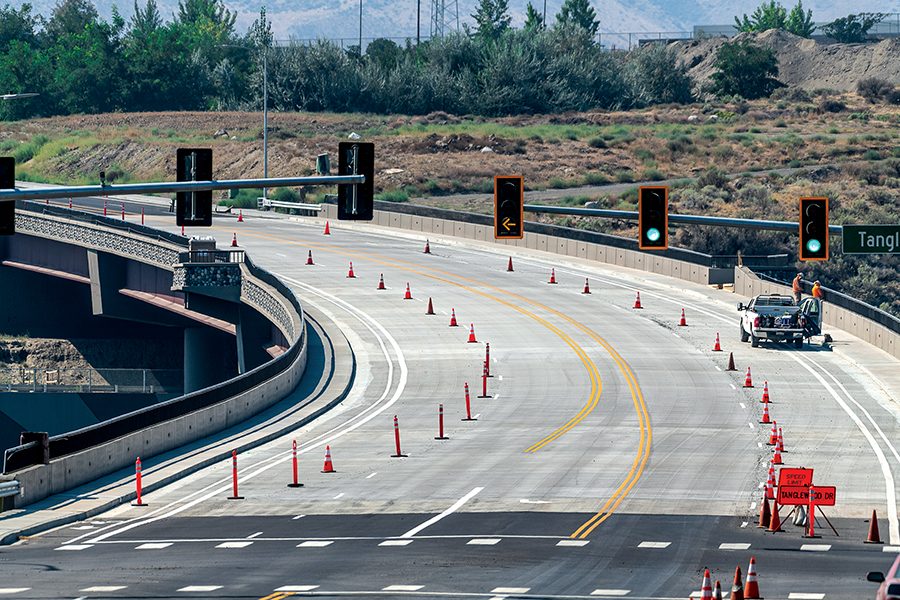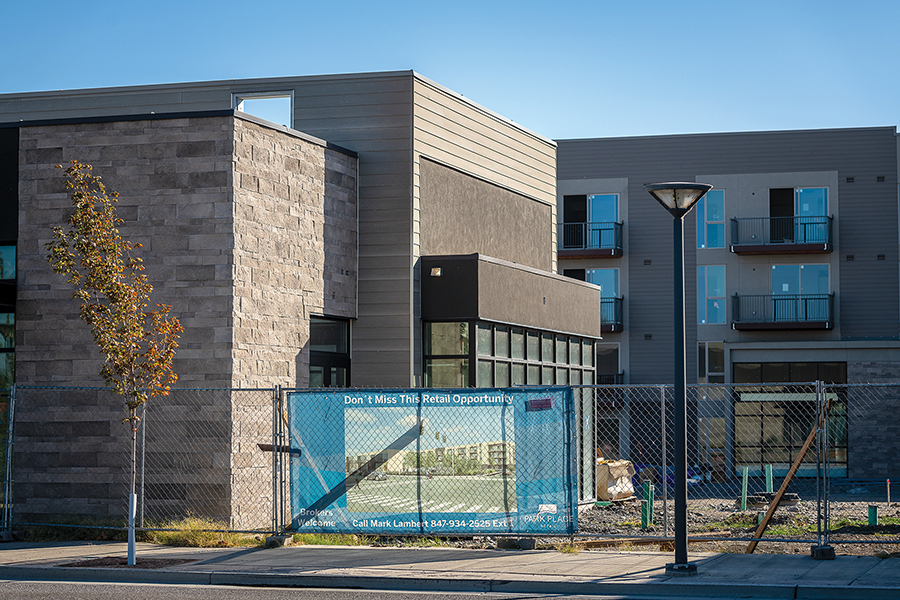
Home » City of Richland: Major construction projects span city limits
City of Richland: Major construction projects span city limits

October 15, 2020
A global pandemic hasn’t slowed progress across the city of Richland as major construction projects wrap up and new ones prepare to break ground.
The $43 million Duportail Bridge opened to limited traffic in early September 2020. It is expected to fully open by Nov. 1, 2020, providing a new span across the Yakima River and connecting central Richland with the busy Queensgate Drive shopping hub.
“The project came in well under the total expected costs,” said Pete Rogalsky, public works director for the city of Richland.
Project completion was delayed by about 30 days but an overall savings of “$1 to $2 million, possibly more” was realized due to water and road construction costs.
“But none of that savings is local (money), except from water bills in town. What we don’t spend on the bridge stays in the water fund and helps us avoid raising user rates if our costs go higher,” said Rogalsky, who added that the remaining savings came out of grant money. What isn't spent in grants goes back to the agency that awarded it.
There’s a chance some of the money may be allocated toward minor enhancements of the Bypass Highway in the next couple years.
Richland, the state’s 21st largest city, has seen modest population increases each year for the past decade. It has grown by 22% since 2010. From 2019-20, the city grew 3% to 58,550 residents.
With the housing market continuing to be tight throughout the Tri-Cities, Richland issued 257 single-family home permits valued at $80.9 million through August 2020, compared to 235 valued at $71 million for the same period in 2019.
Several residential projects stand ready to help meet the demand in the coming year.
Luxury apartments
The Duportail Bridge will offer easier access to the city’s downtown core where the highly-anticipated Park Place development at 650 George Washington Way prepares for residents to fill about 100 units ranging from studio to two-bedroom apartments.
Developers expect the first tenants to move in before Thanksgiving. In early fall, about 10 of the 106 units were leased. Rents range from $1,250 for the lowest-priced studio to $2,000 for the highest-priced two-bedroom.

Work on Park Place started a year before Covid-19 restrictions went into effect but suffered a full six-week shutdown in spring 2020.
Once work restarted, the project dealt with staffing shortages while trying to complete the high-profile residences overlooking Howard Amon Park and the Columbia River.
“Everybody’s project got shut down and backed up,” said David Lippes, principal of Richland-based Boost Builds, which is developing Park Place with Crown Group, of Chicago. “Labor wasn’t finished with prior projects and there were labor shortages as the subcontractors tried to satisfy everyone.”
Prior to the ramp up of Covid-19 restrictions in March, the team already had noticed trouble developing in China and switched suppliers of cabinetry to a cabinet manufacturer in the United States, despite the higher cost.
“We traded money for a sense of security,” Lippes said. Without specifying the exact cost of project overruns and delays, Lippes said, “Every day work continues, it costs money.”
Originally targeted for completion by the end of 2019, the new occupancy goal for the apartments is the end of October 2020.
Work may continue beyond that on the commercial spaces to build out 7,000 square feet for retail. The first committed tenant will be the eatery Graze - A Place to Eat, which will move its Parkway sandwich shop to the storefronts on George Washington Way, filling about half of the available space in one of the two retail pads.
Park Place will be the first of two high-end apartment complexes set to open. Willow Pointe in north Richland is the other.
The 126-unit complex is described as “resort style,” and developers broke ground on the first $6 million phase this summer.
Boost Builds is also quietly transforming 1100 Jadwin Ave. The commercial building will reopen after a $5.5 million renovation. Updates include a new façade and heating ventilation and air conditioning systems.
“It’s currently a beautiful building with no one in it,” Lippes said. “We expect tenants to reutilize the space as soon as they can, and some have upgraded their spaces.”
Old City Hall property
As their multimillion dollar projects wrap up, the Boost team continues to be a rolling stone, seeking other opportunities to transform the city of Richland.
Lippes said the team made two proposals to the city of Richland for its former City Hall property, but so far there is no movement.
“The city is currently giving thoughtful consideration to several proposals and options for this site, as it is a unique opportunity for the city. With the current pandemic, this project, as with many, has not moved forward as quickly as it may have previously,” said Mandy Wallner, marketing specialist for Richland’s economic development department.
The prime property at the corner of George Washington Way and Swift Boulevard remains unsold and undeveloped, as the city still needs to complete infrastructure improvements and recording details prior to sale.
Mayor Ryan Lukson added the city may “realign its vision or wait further along for the right opportunity to develop” the property that straddles George Washington Way and Jadwin Avenue.
“Our larger visions could be about 500 residential units,” said Lippes, which would include Park Place, the former City Hall site and plans to develop residential space at 1200 Jadwin Ave.
“Then there’s 500 families bringing bike traffic, retail traffic and revitalization to the area. Our motivation remains as high as when we visualized it a number of years ago, to have a real downtown: lively during the day and lively at night.”
The vacant City Hall lot is one of several available sites on the market, including restaurant space near Swift and George Washington Way that is frequently asked about. Wallner expects the sites will stay vacant until the former City Hall property is developed.
As commercial and residential tenants move into Park Place, it could generate more interest across the street at 601 George Washington Way, the empty site of the former Tri-Cities Battery. The former Albertsons on Lee Boulevard in the city’s central has sat vacant since the grocery closed more than three years ago.
Richland City Hall remains closed to the public, but the city is serving customers electronically and over the phone, while details of the 2021 budget are worked through.
“As we put together our 2021 budget we are working conservatively, to the best of our ability, to anticipate potential shortfalls in some areas and are working on strategic mitigation efforts for impacts that do occur,” Wallner said. The last approved budget topped $308 million, with $61 million in the general fund.
Horn Rapids developments
Big plans are in place for the north end of Richland, including the Horn Rapids residential neighborhood.
“I think it’s going to be one of Richland’s highlights,” said Brad Rew, general manager of the Horn Rapids Golf Course and owner of Gale-Rew Construction.
Work has started on a $1.4 million roundabout at Clubhouse Lane and Kingsgate Way. It will make way for eight commercial properties on city-owned land there.
“There’s a lot of interest in that, including from myself,” Rew said.
Two gas stations with convenience stores will be built at the intersection with Highway 240. One already is underway by LCR Construction and will include a Firehouse Subs.
“There’s going to be quite a bit of change in Horn Rapids over the next three years,” Rew said.
Rew plans to add 54 town-
homes starting at the first of the year at the golf course.
It’s part of an overall plan to redo the course, clubhouse and surrounding facilities.
The townhomes will be built over one to three years.
“They’ll be next to the tennis courts, pool, driving range,” Rew said.
He said that a lack of buildable lots in the fast-growing south Richland has pushed interest back to Horn Rapids.
“There’s so much happening, just keep watching it. It’s one of the best communities in Richland, as far as walking paths, how wide they are, the number of parks — and it’s only getting better,” he said.
Construction + Real Estate
KEYWORDS october 2020





